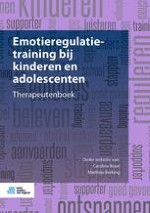Samenvatting
De adolescentie is een kritische periode voor de ontwikkeling van emotieregulatievaardigheden en wordt gekenmerkt door een toename in psychopathologie. School-gebaseerde preventieprogramma’s kunnen hierop anticiperen. In dit hoofdstuk bespreken we vooreerst Boost Camp, een universeel preventieprogramma voor leerlingen in een kwetsbare ontwikkelingsperiode, dat focust op het stimuleren van hun emotieregulatievaardigheden. Verder moet er ook aandacht zijn voor secundaire en tertiaire preventie. Als illustratie bespreken we hier TIME-IN, een schoolbreed zorgbeleid, primair gericht op het versterken van sociale en emotionele competenties van risicoleerlingen, gedragen door het ganse schoolteam. Beide programma’s worden reeds enkele jaren geëvalueerd door de Universiteit Gent en bovendien warm ontvangen door leerlingen, leerkrachten en andere betrokkenen.
